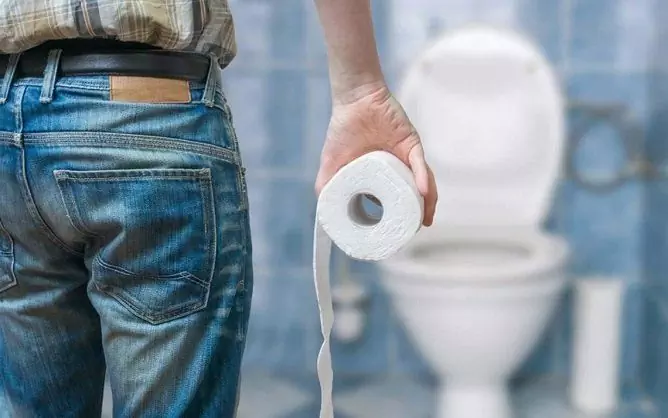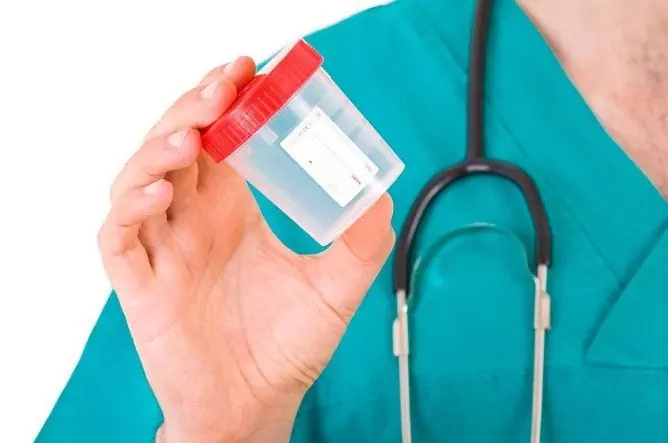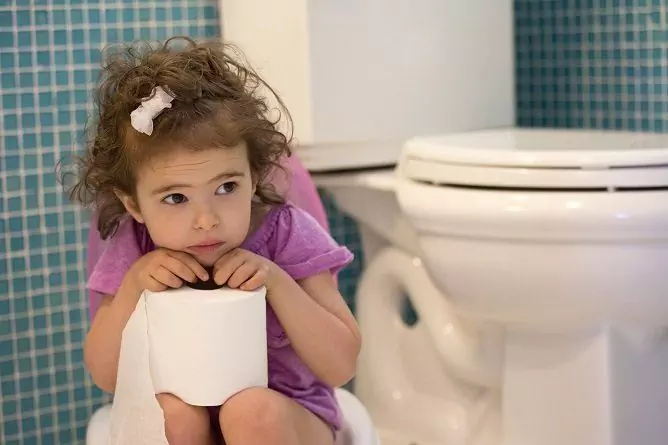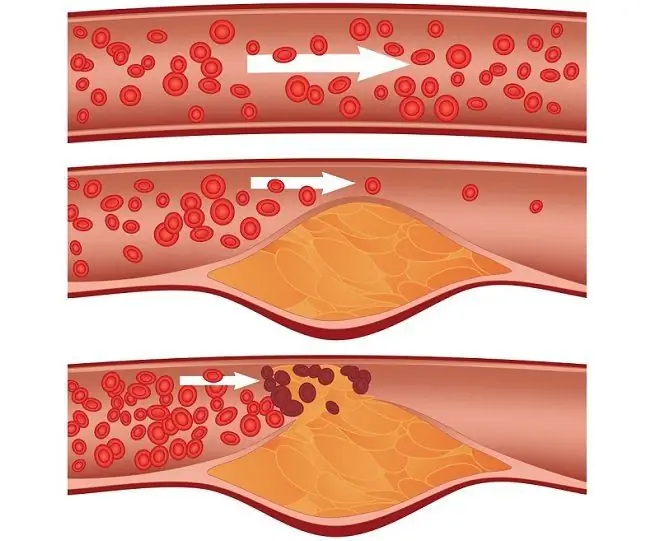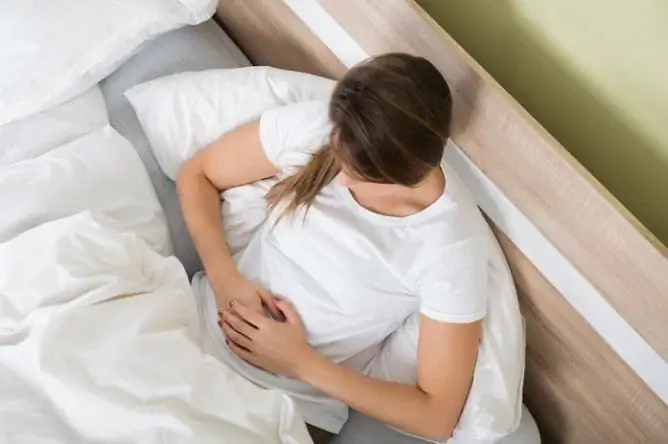- Author Rachel Wainwright wainwright@abchealthonline.com.
- Public 2024-01-15 19:51.
- Last modified 2025-11-02 20:14.
Constipation
The content of the article:
- What does it mean
- Constipation reasons
- Varieties of pathology
- Constipation symptoms
- Diagnostic methods
-
What to do to get rid of
- Diet and lifestyle correction
- Medication
- Folk remedies
- Etiotropic treatment
- Complications
- Video
Defecation disorders are a common problem in modern humans. Constipation of varying severity affects about 50% of the adult population. Treatment of constipation is complex - if possible, the cause is eliminated, the diet is adjusted, medicines and folk remedies are used. You can treat pathology at home or in a hospital, it depends on the duration of stool retention, the presence of additional symptoms and complications.

Constipation is often associated with lifestyle errors: improper diet, physical inactivity
What does it mean
Constipation is a disorder characterized by impaired bowel movement. Constipation is considered to be emptying the intestines less than 3 times a week. Lack of stool throughout the day is not constipation.
Constipation is manifested not only by stool retention, but also by a change in the consistency of feces. What feces look like:
- dry;
- solid;
- chest-like;
- scarce.
In most cases, defecation disorder is only a symptom of the disease, and not an independent nosology. Less commonly, constipation is considered a separate disease, with its own causes and characteristic symptoms.
Constipation reasons
The onset of pathology can be associated with various factors, there is no single reason. Constipation in adults is often associated with inaccuracies in the diet, but serious diseases of the digestive tract or other systems can also be the cause. So, the most often influenced by the following factors:
- Improper diet: lack of fiber in the diet, excessive intake of fat and fast carbohydrates.
- Insufficient fluid intake.
- Sedentary lifestyle, prolonged bed rest.
- Diseases of the colon and anus: neoplasms, hemorrhoids, anal fissure.
- Hormonal imbalance: hypothyroidism, menopause in women.
- Psychological factors: overexertion, emotional shock, stress.
- Diseases of the nervous system: damage to the nerves, spinal cord.
Varieties of pathology
There are several types of pathology - along the course and the mechanism of development. Determining the type of disease is important for the selection of therapy, since the tactics of treatment for different forms of pathology are different.
Depending on the mechanisms of the development of pathology, several types of constipation are distinguished:
| View | Explanation |
| Alimentary | Violation of defecation is associated with dietary habits - lack of dietary fiber and water in the diet. |
| Mechanical | The reason is organic changes in the intestines, which make it difficult for the passage of feces. These can be malignant and benign formations, worms. |
| Proctogenic | Violation of defecation occurs due to damage to the rectum and anus (proctitis, paraproctitis, hemorrhoids, anal fissure). |
| Psychogenic | The occurrence of constipation is associated with any psycho-emotional factors. This often occurs when moving, a tense work environment, a long flight (especially among those who fly for the first time). |
| Neurogenic | The reason is functional disorders associated with disturbance of intestinal innervation. |
| Iatrogenic |
The reason may be the use of drugs that inhibit peristalsis, as well as the abuse of laxatives. |
Two forms of pathology are distinguished along the course:
- Chronic constipation - clinical manifestations are observed for at least 3-6 months.
- Acute constipation - symptoms occur and increase over several days.
Constipation symptoms
The main sign of constipation is bowel movements less than 3 times a week. There are also other characteristics:
- feces hard, dry, dense;
- difficulty during bowel movements;
- the need for additional manipulations for bowel emptying;
- heaviness in the abdomen that disappears after emptying;
- a feeling of fullness in the intestines, incomplete emptying.
The nature of the symptoms is determined by the type of pathology:
| Pathology type | How long do the main symptoms last and how do they occur? | Additional manifestations |
| Chronic | Signs are permanent, persistent, present for more than 6 months. | Long-term pathology, as a rule, is accompanied by intoxication. Sleep is disturbed, appetite decreases, weakness and fatigue constantly occur. |
| Acute | They arise suddenly (within a few hours, days), episodically. | The acute form of stool retention often presents with severe abdominal pain, nausea, and vomiting. |
Diagnostic methods
Identifying constipation is usually straightforward; it is much more difficult to identify its cause. At the initial stage of diagnosis, the doctor determines the presence of clinical signs (frequency of bowel movements, the nature of feces), and also conducts a physical examination:
- Superficial and deep palpation of the abdomen - pain is determined, the nature of the contents of the intestine.
- Abdominal percussion - intestinal distention is determined.
- Digital rectal examination - to identify hemorrhoids, prolapse, anal fissure, tumor formations.
Additional methods are aimed at identifying the cause and assessing the general condition of the body. Diagnostics is carried out from simple to complex, that is, they begin with general clinical analyzes, and invasive studies are carried out last.
| Diagnostic method | Who are they | Explanation |
| Complete blood count (CBC) | All patients |
With the help of the UAC, one can assume the presence of: · Inflammatory process: leukocytosis, increased ESR; Bleeding: a decrease in the level of red blood cells and hemoglobin; · Helminthic invasion: an increase in the level of eosinophils. All of these conditions can lead to stool retention. |
| Coprogram | All patients |
The following changes can be detected: · Rounded feces, in the form of balls of different sizes; · Flat epithelium and erythrocytes are found; · Little fiber, dietary fiber. |
| Plain X-ray of the abdominal organs | In acute form | With obstruction of the intestinal lumen, signs of acute intestinal obstruction (Kloyber's bowl) can be determined. |
| Endoscopic examination (colonoscopy) | At the 2nd stage of diagnosis |
Colonoscopy can be used to assess the condition of the large intestine: · Condition of the mucous membrane (hyperemia, erosion with colitis); The presence of tumor-like formations, which can lead to obstruction of the intestinal lumen. |
| Anorectal manometry | At the 2nd stage of diagnosis | Anorectal manometry examines the tone of the anal sphincter. |
If necessary, more specific studies can be prescribed: determination of the level of thyroid hormones (if hypothyroidism is suspected), biochemical blood test (liver pathology, diabetes mellitus), etc.
What to do to get rid of
With prolonged constipation, you should definitely consult a doctor, and not self-medicate. Therapy is selected taking into account the cause and form of the disease, so it is not recommended to choose drugs according to reviews. Constipation treatment includes several areas: diet, medication, herbal remedies and lifestyle correction. If possible, you need to create an individual rhythm of bowel movement in order to avoid restraining the urge to defecate. Etiotropic treatment is considered separately, when constipation is not a separate pathology, but only a symptom of a disease.
Diet and lifestyle correction
Eating a healthy diet is essential to treating constipation. It is necessary to increase the consumption of foods that speed up bowel movement:
- fresh fruits and berries (except grapes and bananas);
- non-starchy vegetables;
- dried fruits, especially prunes;
- buckwheat and oatmeal;
- seaweed;
- Rye bread;
- fermented milk products: kefir, fermented baked milk, yogurt.
Foods that delay bowel movement should be avoided. These are foods that contain tannin, as well as foods that cause gas production:
- strong tea, coffee, cocoa;
- blueberries;
- red wines, grapes;
- red meat;
- animal fats;
- rice and semolina porridge;
- chocolate, rich products;
- legumes, cabbage.
Fractional meals are recommended - you need to eat often, but in small portions. Consumption of large amounts of liquid is also shown. It is recommended to drink at least 2 liters of clean water per day, drink weak green tea, fruit and herbal teas.

One of the main elements of constipation treatment is proper nutrition.
Medication
Laxatives are used for symptomatic treatment; they will not help cure the disease. It is highly not recommended to take only laxatives, since all drugs in this group are addictive.
What drugs can be used:
- Phytolax chewable tablets;
- Senade tablets;
- Dufalak syrup;
- oral drops Picolax;
- bisacodyl tablets;
- syrup Normase;
- Mucofalk granules.
Folk remedies
Folk remedies can also be used to loosen the intestines. They are used for intermittent constipation, as well as as an additional treatment for the chronic form of the disease. Periodic intake of folk remedies will help prevent the development of constipation.
| Name of funds | How to cook | How to use |
| Broth of buckthorn, senna and rhubarb | To prepare the broth, take 1 tsp. rhubarb root, 1 tsp buckthorn bark, 1 tsp. senna leaves and 400 ml of water. Pour the mixture of plants with cold water and hold in a water bath for 15 minutes. | 50 ml before bedtime. |
| Castor oil | No preparation required. | 1 tbsp. l. castor oil at night for 3 days. |
| Decoction of prunes and buckthorns | To prepare the broth, take 100 g of prunes and 300 ml of boiling water. Simmer over low heat for 15 minutes. Add one teaspoon of buckthorn bark and boil again over low heat for 10 minutes. Cool and strain the broth. | At night, 100 milliliters for 7 days. |
Etiotropic treatment
When the cause is identified, etiotropic treatment is used. It depends on the symptom of which disease constipation is. The drugs should be prescribed by a doctor after a complete examination.
| Cause | Brief description of treatment |
| Hemorrhoids | For treatment, medicinal or surgical methods are used. Medical treatment consists in the use of venotonics (Detralex, Normoven). Surgical - in the removal of hemorrhoids. |
| Side effects of drugs | It is necessary to stop taking medications that caused constipation. Additional treatment is not required in most cases. |
| Colitis, proctitis |
Complex colitis treatment: Diet; · Adsorbents; Laxatives · Drugs that stimulate regeneration; · Prebiotics and probiotics; · Detoxification treatment; · Vitamins. Antiparasitic agents or antibiotics can be used to eliminate the cause. With proctitis, the drug is often used in the form of rectal suppositories. |
| Colon tumor | If a tumor in the colon is the cause of constipation, treatment is to remove the tumor. In this case, symptomatic treatment will be ineffective. |
| Helminthic invasions | For the treatment of helminthiasis, antiparasitic drugs are used: Pirantel, Mebendazole and others. |
Complications
Long-standing pathology can lead to the development of a number of complications. Most often, secondary inflammation occurs:
- colitis;
- proctitis;
- paraproctitis;
- enteritis (when the contents of the cecum are thrown into the small intestine);
- hepatitis, cholecystitis.
One of the most dangerous complications is acute intestinal obstruction. In this case, an emergency surgical intervention is required, home treatment is unacceptable.
Another dangerous complication is colon and rectal cancer. It is believed that a lack of fiber in the diet and prolonged stagnation of contents in the intestine leads to the formation of carcinogens that affect the intestinal wall.
Video
We offer for viewing a video on the topic of the article.

Anna Kozlova Medical journalist About the author
Education: Rostov State Medical University, specialty "General Medicine".
The information is generalized and provided for informational purposes only. At the first sign of illness, see your doctor. Self-medication is hazardous to health!

